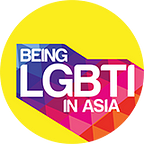Preliminary findings of study on employment discrimination of LGBTI people shared at ILGA World Conference
29 November 2016
Preliminary findings of a soon-to-be released study by UNDP on employment discrimination based on sexual orientation, gender identity/expression and intersex status in China, the Philippines and Thailand were shared at an ILGA World pre-conference session today in Bangkok.
The findings were shared during a full-day session, titled Workplace Pride Business Conference, which explored the importance and challenges for inclusion of LGBTI people in the world of work. Organized by Workplace Pride, ILGA and OUT BKK, and sponsored by IBM, Clifford Chance and the Ministry of Foreign Affairs of the Netherlands, the session brought together employers and employees, government, civil society and development partners.
Globally, there is growing evidence that discrimination of lesbian, gay, bisexual, transgender and intersex (LGBTI) people has significant harmful costs associated with it — both social and economic. Higher rates of unemployment, underemployment and reduced productivity as a result of employment discrimination are costly to society.
According to LGBTI Capital, in 2015 the “Pink Market” is estimated to be US$ 3.7 trillion globally. Not only is exclusion of sexual and gender minorities a social issue, but it is increasingly evident to companies that it makes financial sense to cater to this sizable market. In the Asia-Pacific region, it is estimated that there are at least 100 million LGBTI people.
Employers are also becoming more aware that inclusion of sexual and gender minorities in the workplace can promote creativity and innovation, allowing companies to attract and retain top talent and create more engaged and loyal employees.
There has been progress at the policy level in the Asia-Pacific region and increased visibility in many countries. Pride events are being organized annually in many cities, ant-discrimination legislation has been enacted and there is increasing community mobilization to advocate for issues related to equality and inclusion. Nonetheless, discrimination continues to be significant challenge faced by LGBTI people in region.
The UNDP study collected data from a total of 1,758 respondents through focus group discussions, an online survey and executive dialogues conducted in China, the Philippines and Thailand.
Amongst the key preliminary findings, the study found that there was widespread discrimination in entry to the job market, presenting barriers for LGBTI applicants in the hiring process. In China, Philippines and Thailand respectively, 47 percent, 44 percent and 45 percent of respondents reported that job advertisements excluded them based on their SOGIE.
The data showed there was limited acceptance and openness in the workplace. Hiding one’s SOGIE, especially in early stages of employment was reported to be common. In China, only 24 percent reported that they perceived open and tolerant attitudes towards LGBTI people in their workplace. The Philippines and Thailand showed higher figures, at 80 and 90 percent, however, participants explained that acceptance was often conditional to conforming to traditional values. Lesbian and bisexual women were revealed to be less open and accepted than gay men. Trans women tended to be more “out” than trans men.
Respondents in the study indicated that they experienced both direct and indirect discrimination at the workplace. Verbal abuse and harassment, including hostile jokes, social exclusion at work, were reported, as well as less job security and limited career advancement opportunities. Only about 30 percent of participants who encountered such issues reported it to their immediate supervisor or the human resources department in their office.
Protective formal policies in the workplace were rare. Only 12 percent of respondents reported that they had access to equal benefits for same-sex partners at their place of employment. Just 11 percent had access to an official complaint procedure for cases of discrimination based on SOGIE. Where protective policies were in place, there was strong correlation with reduced workplace discrimination in all three countries, and also much higher levels of reported job satisfaction. Overall, those employed in the private sector reported less discrimination than those in the public sector in China and the Philippines (in Thailand there was no difference). Multinational companies and international non-governmental organizations were found to be most likely to have explicit protective policies in place.
Transgender people were found to face the highest levels of discrimination. Issues reported included: stereotypical attitudes, uniform requirements, toilet facilities, prejudice and privacy when identities do not match the gender on official identity documents.
The study made key recommendations that employers can adopt in order to reduce discrimination of LGBTI people in the workplace:
- Develop and implement formal policies and dispute resolution mechanisms for inclusion, anti-discrimination and equal treatment. Learn from existing good practices.
- Include workplace diversity in corporate values and support it in action through backing from leadership and encouraging organization of LGBTI workers.
- Provide targeted training on inclusive work practices, equality and non-discrimination to all staff, managers and human resources units.
The study was conducted by Being LGBTI in Asia programme, a regional programme aimed at addressing inequality, violence and discrimination on the basis of sexual orientation, gender identity or intersex status, and promotes universal access to health and social services. Being LGBTI in Asia is supported by UNDP, the Embassy of Sweden in Bangkok and the U.S. Agency for International Development.
